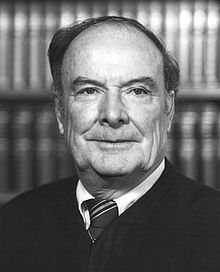|
J. Skelly Wright
James Skelly Wright (January 14, 1911 – August 6, 1988) was a United States circuit judge of the United States Court of Appeals for the District of Columbia Circuit and previously was a United States district judge of the United States District Court for the Eastern District of Louisiana. Early life and careerBorn on January 14, 1911, in New Orleans, Louisiana, Wright received a Bachelor of Philosophy in 1931 from Loyola University New Orleans and a Juris Doctor in 1934 from Loyola University New Orleans College of Law. He was a high school teacher in New Orleans from 1932 to 1936. He was a lecturer at Loyola University New Orleans from 1936 to 1937. He was an Assistant United States Attorney for the Eastern District of Louisiana from 1937 to 1942 and again from 1945 to 1946. He was a United States Coast Guard lieutenant commander from 1942 to 1945. He was in private practice in Washington, D.C., from 1946 to 1948.[1] Wright was the United States Attorney for the Eastern District of Louisiana from 1948 to 1949.[2] He was faculty at the Loyola University of New Orleans College of Law from 1950 to 1962.[1] Eastern District of LouisianaWright received a recess appointment from President Harry S. Truman on October 21, 1949, to a seat on the United States District Court for the Eastern District of Louisiana vacated by Judge Wayne G. Borah. He was nominated to the same position by President Truman on January 5, 1950. He was confirmed by the United States Senate on March 8, 1950, and received his commission on March 9, 1950. His service terminated on April 15, 1962, due to elevation to the District of Columbia Circuit.[1] During his service with the Eastern District of Louisiana, Wright was an important leader during the New Orleans school desegregation crisis. Wright's first desegregation order had been for the Louisiana State University Law School in 1951. His vigorous enforcement of Brown v. Board of Education (1954), however, made him many enemies amongst the predominantly white political and business culture of New Orleans to the extent that his entire family was soon ostracized and isolated from much of New Orleans' society life.[3] D.C. Circuit CourtWright was nominated by President John F. Kennedy on February 2, 1962, to a seat on the United States Court of Appeals for the District of Columbia Circuit vacated by Judge E. Barrett Prettyman. He was confirmed by the Senate on March 28, 1962, and received his commission on March 30, 1962.[1] He served as Chief Judge from March 27, 1978 to January 14, 1981.[4][5] He assumed senior status on June 1, 1986.[1] He served as a Judge of the Temporary Emergency Court of Appeals from 1981 to 1987, serving as Chief Judge from 1982 to 1987.[1] Notable cases
Death and legacyHis service terminated on August 6, 1988, due to his death in the Westmoreland Hills neighborhood of Bethesda, Maryland.[1] Justice William J. Brennan Jr. wrote a memoriam for Judge Wright in the Harvard Law Review.[9] Wright is recognized for exerting a major influence on the American law of landlord-tenant. Several of his decisions on the D.C. Circuit helped modernize landlord-tenant jurisprudence by incorporating consumer protection principles long accepted in contract law.[10] The J. Skelly Wright Professorship at Yale Law School is named in his honor.[11] Notable former clerks
See alsoReferences
External links
|
||||||||||||||||||||||||||||||||||||||||||||||||
